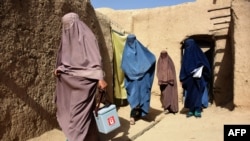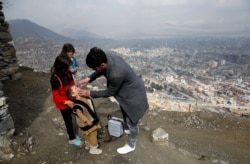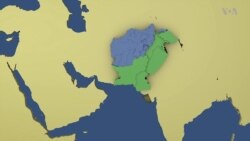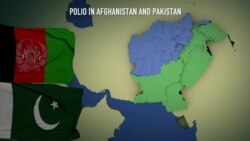Afghanistan and Pakistan witnessed a spike in reported polio cases last year, further highlighting what local officials call an imminent threat to the border region between the two countries caused by militant threats and misinformation.
“2019 has really been a bad year for polio eradication in Pakistan,” Rana Muhammad Safdar, Pakistan national coordinator for polio eradication, told VOA.
“Misconceptions about the vaccination and polio eradication are seen as a Western agenda especially after the Shakil Afridi episode,” said Safdar, referring to a Pakistani doctor who allegedly helped the CIA to track and ultimately kill Osama Bin Laden in 2011 through a fake hepatitis vaccination program.
In Afghanistan, officials say parents refused to immunize their children because of fear of being targeted by the Taliban, which sees medical teams as a threat to its control in the region.
“One of the reasons for Taliban’s oppositions to house-to-house vaccination is that they suspect the vaccinators might spy on them,” said Hedayatullah Stanikzai, a polio eradication representative to the Afghan health ministry.
Polio is a disabling and potentially deadly infectious viral disease.
The Centers for Disease Control and Prevention says the virus spreads from person to person and can infect an individual’s spinal cord, causing paralysis.
According to the World Health Organization (WHO), Afghanistan, Pakistan and Nigeria are the only countries in the world where polio has not been eliminated. While WHO is on the verge of declaring Nigeria polio-free, Afghanistan and Pakistan are seeing an uptick in new cases since 2018.
Current statistics show the number of Wild Polio Virus (WPV1) cases in 2019 to be 137 in Pakistan and 28 in Afghanistan, a significant increase since 2018 when 12 polio cases were reported in Pakistan and 21 in Afghanistan. Pakistan in 2019 reported an additional 18 cases of Circulating Vaccine-Derived Poliovirus (cVDPV2), a strain of polio declared eradicated several years ago.
Afghan and Pakistani officials say the majority of the reported cases come from predominately ethnic Pashtun areas along the border between the two counties. For years, the area has been infiltrated with militants who often target vaccination teams.
Militant targeting
While no incidents have been reported in Afghanistan in 2019, at least 11 polio workers were killed on the Pakistan side of the border, raising the number to 92 deaths since 2012. A Tehrik-e Taliban Pakistan (TTP) attack in December on a vaccination team in Lower Dir District of Khyber Pukhtunkhwa last month left two policemen dead.
In addition to militant threats, polio workers complain that they are also faced with hostility from parents who refuse to vaccinate their children.
Zalija, a female polio worker in Quetta, Baluchistan, told VOA that many polio workers are forced by parents to put fake polio markers on their children who were not vaccinated. Those workers who refuse are threatened with violence.
“They even threatened my life. Some tell me they will shoot me with their gun or pistol; they push me, they swear at me, and say all kinds of things to scare me away from giving their children drops,” said Zalija, adding that many unvaccinated children were given markers on their fingers because of pressure from local parents.
Both governments in Kabul and Islamabad have made the vaccinations compulsory to motivate parents. Programs remain difficult to enforce because of a lack of trust in the vaccines, however.
‘Misconceptions’
Afghanistan’s national immunization director Gula Khan Ayub told VOA that during the nationwide vaccination drive in 2019, some 10 million children were targeted but only 8 million were vaccinated. Pakistan’s Health Minister Zafar Mirza previously reported about 200,000 vaccine refusal cases out of 40 million.
Polio campaign workers say many parents fall victim to anti-polio propaganda by extremist groups who claim anti-virus drops are a ploy by the West to create infertility amongst Muslims.
WATCH: Polio Remains Imminent Threat in Militant-hit Areas of Afghanistan and Pakistan
“The parents that refuse to give their children polio vaccinations tell me that the drops make you infertile. Some tell me that that the vaccination is made of pig fat or the urine of Americans. Others refuse, saying that it is a Western conspiracy,” Irfanullah, a polio-worker in Khyber Pukhtunkhwa told VOA.
According to the World Health Organization, the vaccine and the oral drops are produced primarily using the Sabin vaccine seeds or through inactivated poliovirus strains.
A Peshawar schoolteacher last April made a video that went viral on social media, claiming that the government administered polio drops were “poisonous” causing illness among children. Following the video, thousands of parents refused to vaccinate their children.
Raising awareness
Some officials charge that local communities also use eradication campaigns as “bargaining points” to voice their grievances with the government. Officials in Baluchistan cited “demand-based refusal” as a major hurdle in high-risk polio endemic areas where local residents conditioned accepting polio drops in return for more government services.
Said Mohammad Omar, a resident of Qila Abdullah who refused to give his child polio drops, accused the Pakistani government of neglecting the community’s basic health care needs.
WATCH: Fighting Polio in Pakistan, Afghanistan
Omar told VOA, “I will not give polio drops to my child. Polio teams keep coming to my home, yet we do not have doctors in our hospitals here. The government is concerned about eradicating polio but they don’t care about our basic health needs,” he told VOA.
Governments on both sides of the border have tried to combat the misinformation, including seeking out help from local religious institutions and international organizations such as WHO and the UN’s children agency UNICEF.
“People in some conflict-stricken areas, where schools are closed and the level of awareness is low, don’t know about the importance of polio vaccines,” said Stanikzai of Afghanistan’s health ministry. Afghan health officials, he added, “believe that religious scholars can play a vital role with the issue of awareness and have asked the local Imams to speak out about the importance of polio vaccination during their sermons.”
Regardless the efforts, many local communities maintain their anti-vaccine views, according to officials.
Nadeem Jan, the head of the Khyber Pukhtunkhwa Polio Emergency Operation, said that the ethnic Pashtuns along the border are particularly vulnerable to the misinformation campaign because of their conservative beliefs.
“Despite religious clerics clarifying that these rumors are not true, they persist,” he told VOA.
VOA’s Shaheen Shah Afridi , Naimat Ullah Serhadi, Arshad Mohmand and Ibrahim Rahimi contributed to this report.









